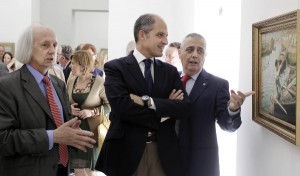The unthinkable has happened and Valencia regional premier Francisco Camps has stood down due to his imminent trial to face corruption charges. The decision, it seems, did not come from Camps himself, who had clung to his post like a limpet despite mounting evidence that he received around €14,000 worth of tailored clothes from businessmen in exchange for awarding lucrative contracts on behalf of the regional government.

Instead, it was reportedly Popular Party leader Mariano Rajoy who pressured Camps to either step aside or declare himself guilty. Either option would avoid a damaging corruption trial of a high-profile PP baron in the autumn, when the party might be waging a general election campaign.
The interesting thing about this affair lies not so much in the details of the flashy suits or designer brogues that Camps allegedly lapped up as gifts. It’s how he, his party and Valencia society in general have reacted to his predicament.
On announcing his resignation, Camps said he was “voluntarily offering this personal sacrifice, so that Mariano Rajoy will be the next prime minister.” So far, so Camps. But he unwittingly spoke volumes about his style of government when he said: “We’re the best, this is the best place, this is the greatest region in Spain and the best region in Europe, that’s why these things have happened.”
Ignoring his monumental provincialism for one moment, “these things” seem to include running the region like a personal fiefdom, where those in power respond above all to corporate and electoral interests. Criticism, or questions about the Gürtel corruption case are swatted away with a snigger. Camps’s attitude to the media, or the media deemed “unfriendly”, is summed up by the fact he granted his first interview in two years in May, during the local election campaign.
Time and time again, Valencia’s senior PP officials have told us that whatever the charges “Paco” faces, they don’t matter because he keeps winning elections.
“Camps will be absolved at the ballot box,” said Carlos Fabra, leader of the PP in the Valencian province of Castellón who himself has faced a battery of corruption allegations, in February. This confusion of political popularity with legality helped keep Camps in his post even when the evidence against him started to look damning. And when Camps delivered yet another massive win for the PP in May’s vote, it was a further argument for those who believed that political success equals innocence. It’s rather like the argument that became fashionable in Hollywood to defend Roman Polanski against rape charges: “But he’s such a great director”.
In his February defence of Camps, Fabra also revealed how normal he thinks it is for politicians to receive gifts. “There is no one in a senior office in Spain, from the judiciary through to the monarchy, the Senate, Congress, mayors, local councillors … who doesn’t receive gifts at Christmas,” he said. What he forgot to mention was that when someone gives you a gift, then you owe them something – unless they’re Santa Claus, of course.
But perhaps those who come out of this whole episode worst of all are the people of Valencia – or at least a slim majority of them – who, despite facing unemployment, economic hardship, a burst property bubble and a dismal short-term future, keep rewarding a set of politicians who seem utterly removed from their predicament, and are allegedly prepared to hand public money to dodgy companies in exchange for a pair of shoes or what they think is a stylish suit.
“what they think is a stylish suit” has it all.